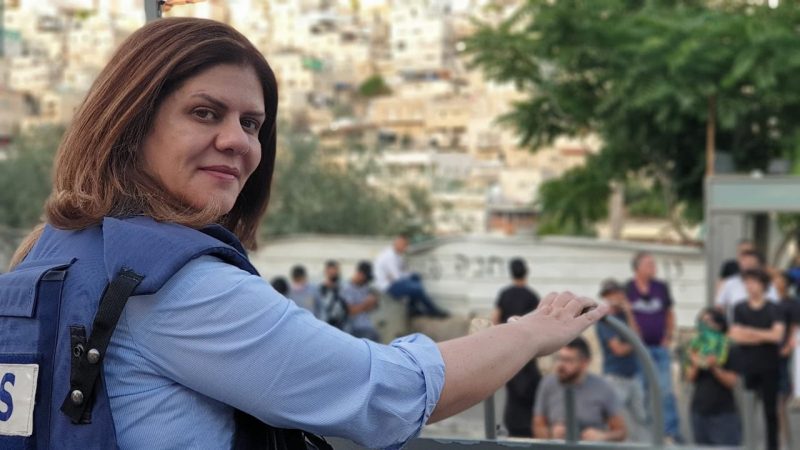The US Joe Biden administration found itself under increasing pressure to probe the killing, standing at crossroads between global demands for accountability and its support for its ally, Israel.
The FBI has opened an investigation into the killing of Palestinian-American journalist Shireen Abu Akleh six months since the harrowing incident, Axios reported on Monday.
The US Justice Department (DOJ) informed the Israeli Justice Ministry about the FBI’s probe, five sources privy to the matter including Tel Aviv officials confirmed to Axios.
The investigation would see Washington, Israel’s main ally, looking into Israeli soldiers involved in the killing of the veteran journalist, marking a major development in the case.
However, angered Israeli defence Minister Benny Gantz described the DOJ’s decision as “a mistake”, saying Israel will not cooperate in the probe.
“I have delivered a message to US representatives that we stand by the IDF’s soldiers, that we will not cooperate with an external investigation, and will not enable intervention to internal investigations,” said Gantz.
On May 11, the world was left shocked after footage that surfaced online showed the body of Abu Akleh slumped on the ground in Jenin, where she had been deployed to cover an Israeli raid.
Abu Akleh was killed while performing her duty, clad in her blue vest and helmet, clearly identifying her as a member of the press. The bullet had targeted an area in Abu Akleh’s skull that was not covered by the helmet she wore at the time.
Responding to the latest development, the slain journalist’s bereaved family said they were “encouraged” by the news after a six-month fight for justice.
“Our family has been asking for a US investigation since the beginning, and it is what the United States should do when a US citizen is killed abroad, especially when they were killed, like Shireen, by a foreign military,” said the family in a statement, shared by Lina Abu Akleh, the late journalist’s niece.
The family added that it hopes te US “will use all of the investigative tools at its disposal to get answers” about the killing while holding the perpetrators to account.
The Abu Akleh’s also said they hope the probe is “truly independent, credible and thorough.”
“We call on all parties with any evidence to respond to investigatory requests from the US States and not stand in the way of justice. Our family is ready to support this investigation however we can be helpful,” said the family.
“This is an important step toward accountability and gets our family closer to justice for Shireen,” added the statement.
In July, the family travelled to the US after President Joe Biden dodged a meeting with them during his Tel Aviv and West Bank visits.
Abu Akleh’s family met with US State Secretary Antony Blinken instead, though the meeting yielded no progress in the case of the slain journalist at the time.
During the same month, the Committee to Protect Journalists (CPJ) called on US authorities to follow up on its meeting with Abu Akleh’s family “with substantive action to investigate her death and bring those responsible to justice.”
Speaking to Doha News last month, Lina demanded an investigation by the FBI while continuing to press the US to take action in the case.
Responding to a question over expectations from the US, Israel’s main backer, Lina noted that it does not “expect criminals to investigate their own crimes”.
“We don’t expect criminals to investigate their own crimes and we expect that the US upholds the values they preach, whether it’s related to the freedom of press, protection of journalists, human rights or democracy,” Lina told Doha News during her visit to Qatar.
Previous investigations
The latest probe would add to a long line of investigations by rights groups and media outlets from the US and beyond, all of which have pointed the blame at Israel.
Israeli human rights group B’Tselem countered Israel’s initial claims at the time, in which it said Palestinian fighters had shot the bullet.
However, eyewitnesses on the ground quickly dismissed this, including Palestinian journalist Shatha Hanaysha, who was with Abu Akleh during her last moments.
Hanaysha said Israeli snipers continued to fire bullets after Abu Akleh dropped dead, preventing anyone around her from providing her with medical assistance.
The bullet that was fired at the journalist also dismissed the claim by Israel.
A US examination found it was likely fired ‘unintentionally’ from Israelis, in an apparent attempt to divert blame for the killing.
US media outlets have also conducted various investigations, amplifying the testimonies of the witnesses on site, with the most recent probes conducted by The New York Times and the Washington Post.
On Friday, a UN Human Rights Council concluded a week of public hearings in Geneva over the killing of Abu Akleh and ongoing human rights violations against Palestinians by the Israeli regime.
Al Jazeera had also submitted a case to the International Criminal Court after the killing, demanding accountability for the murder of its journalist.
Abu Akleh is largely associated with her journalism in Palestine and has become widely known as “the voice of Palestine”. She was also described as “the martyred witness” by many across the Arab world.
To date, Israel has not been held to account for its later attack on Abu Akleh’s funeral, during which occupation forces were seen trying to push her coffin off of the shoulders of pallbearers.
Qatar condemned the violent attack on mourners at the time, with the Amir Sheikh Tamim bin Hamad Al Thani saying that Abu Akleh was denied “a dignified burial”.
Earlier this month, Qatar’s Assistant Foreign Minister Lolwah Al-Khater said the Israeli Occupation Forces’ (IOF) failure to admit its role in the crime is “an attempt to escape criminal responsibility.”
“Israeli occupation forces’ failure to explicitly acknowledge its crime is an attempt to escape criminal responsibility. We call for an independent international investigation and accountability for those responsible,” Al-Khater told a high-level conference in Austria.







